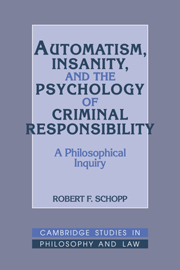Summary
This chapter applies the action theory framework presented in Chapter 4 to the automatism defense. It contends that automatism is most appropriately understood as a failure-of-proof defense regarding the voluntary act requirement. This chapter is intended to serve two purposes: First, it advances a theoretically consistent approach to the types of cases that usually give rise to claims of automatism, and second, it demonstrates that the conceptual framework advanced in Chapter 4 can serve as a useful tool for clarifying difficult issues regarding criminal defenses.
INTRODUCTION AND CONTEXT
Chapter 3 reviewed current approaches to the automatism defense in the United States and Britain, concluding that neither the American courts nor their British counterparts have addressed this defense in a satisfactory manner. The American courts have yet to establish any settled interpretation. Some courts have interpreted the defense as a failure-of-proof defense going to either the culpability or voluntary act requirements, whereas others have treated automatism as a variation of the insanity defense or as some other unspecified general defense. Individual decisions have sometimes been internally inconsistent, describing automatism as a failure-of-proof defense but placing the burden of persuasion on the defendant.
Unlike their American counterparts, the British courts have developed a relatively settled approach. Unfortunately, this approach involves an unsustainable distinction between sane and insane automatism.
- Type
- Chapter
- Information
- Automatism, Insanity, and the Psychology of Criminal ResponsibilityA Philosophical Inquiry, pp. 132 - 159Publisher: Cambridge University PressPrint publication year: 1991

